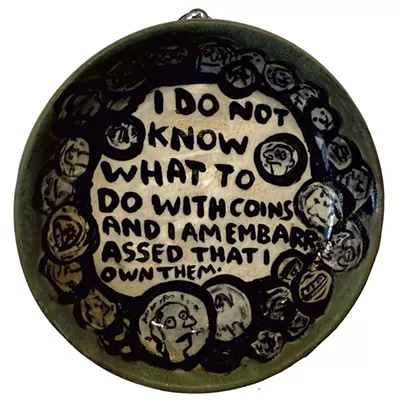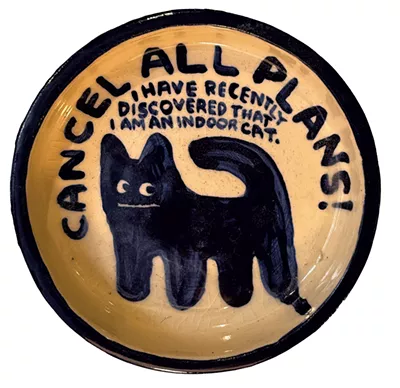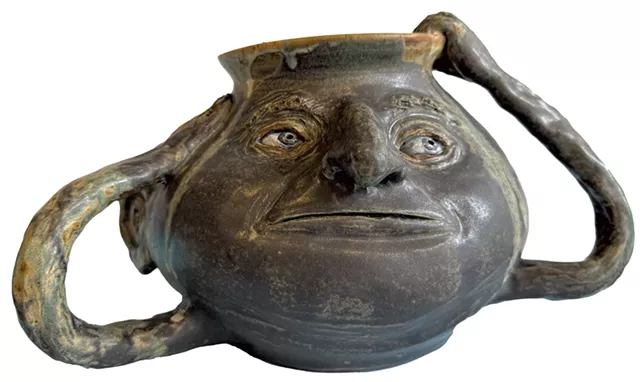Listen, people: We are all pretty well done. You have been sitting in construction traffic forever, it is the sudden end of summer and the seventh month of a fascist takeover of the country — not to mention back-to-school shopping season — and what you need, my friend, is an adorable little plate that says, “Today is a good day to quit your job and start an illegal tilapia farm in the basement. Live the dream!”
OK, maybe that’s just me. But you can get one — and only the one, as everything on display is unique — at “Cheap for Fine Art, Expensive for Dishes,” a show of ceramics by Dave Zackin at Kishka Gallery & Library in White River Junction.
There’s a bowl of cartoon fruit that screams, “OH NO — WE ARE GOING TO BE EATEN!” Another bowl consoles, “The leftover pasta salad is not really gone. It lives on in our memories.” A little coin dish proclaims, “I do not know what to do with coins and I am embarrassed that I own them.”
Some vases and jugs have silly faces. Some scared ones have arms and hands with which they hold their own rims as though the sky is falling. Mugs sport teeth, extra eyes and big noses. There’s a lamp that suggests, “Maybe we should just sit in the dark,” and a clock that asks, “Is it time to start rioting in the streets yet?”
Zackin, who lives in Brooklyn, confesses in his bio, “I still don’t know how to use the wheel. I just take all the unwanted dishes at the ceramics studio and add faces or words to them.” (He also notes that ceramicist Ester Kwon threw some of the larger works for the show.) Despite the self-effacing claim, Zackin’s aesthetic fingerprints are all over the gallery in a “fine art” kind of way. He has painted text and cartoons across the wall-size displays of ceramics, which tell visitors “Don’t touch anything. It’s all going to break” and “The gallery keeps the cheap stuff hidden in the back room.”
According to Kishka co-owner Ben Finer, Zackin creates work and then holds periodic sales via Instagram, which his nearly 100,000 followers often await like the newest iPhone or limited-edition sneaker drop. Many of the pieces at Kishka have already sold, either to established collectors or walk-in visitors, some of whom mistook the show for a new retail store, Finer said.
The strange hybrid objects — which are indeed cheap for fine art ($60 for a ceramic “mixtape” that looks like a cassette) and expensive for dishes ($1,600 for a “vase eating a donut”) — are accessible and goofy, but they’re also artistically relevant, offering relief from the world with their dark humor and consistent voice.
Blurring lines between art and artisanry is currently fashionable, maybe even profitable. But rather than trying to “elevate” craft, as many galleries do, Zackin’s show allows the work to simply exist in neither category, which feels refreshingly honest.
And, as expressed by one of Zackin’s pizza plates, his hybrid approach embraces two truths at once: “The world is often cruel and uncaring, but the food here is pretty good.”



